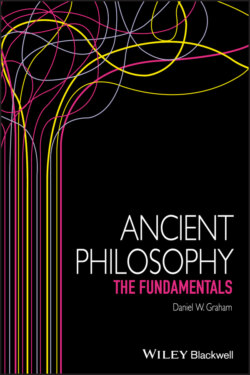Читать книгу Ancient Philosophy - Daniel W. Graham - Страница 6
Оглавление
Preface
When I was asked to prepare this volume for the series Fundamentals of Philosophy, I recognized that there are already a number of valuable introductory works on ancient Greek philosophy in the marketplace. I have created this volume in an effort to provide a work that will both offer a basic survey of the field in a historical sequence of the most influential philosophers, and present an opportunity to enter into the philosophical debates that those philosophers initiated or continued. This work is meant to be accessible to a large audience, but to be more than a primer; it aims to engage the figures as philosophers, with theories and arguments. Accordingly, I hope that this work will prove to be of benefit both to the new student of philosophy and to the professional philosopher, classicist, or humanist who, in the increasingly specialized world of academia, wishes to become better acquainted with this field.
Ancient Greek philosophy grows out of mythological lore, develops its own idioms and problems, and then develops into a sophisticated study from which originate philosophy, natural science, and many other disciplines that we tend to think of as modern inventions. Fortunately, the earliest philosophy begins without technicalities, and subsequent generations add gradually to the vocabulary and theory of the field, so that a historical study of ancient philosophy can introduce the complications of theory gradually and sequentially, as I have tried to do. Needless to say, no slender one‐volume study can do justice to the richness of Greek (and Roman) philosophy. I have provided in the endnotes references to important studies that can carry the reader on to more advanced studies of the material. I follow the story of Western philosophy from its pre‐philosophical mythological roots to its adoption by Christian philosophers who would transmit its messages to the Middle Ages. I have had to be selective in my coverage of thinkers and theories. But I have tried to cover the more important developments in philosophy, with some reflection on the social and political background they grew out of. I have also tried to indicate ways in which ancient thinkers carry on a conversation with their predecessors, and also offer valuable insights to their successors, including of course ourselves.
I would like to express my appreciation to Dr. Al Martinich for inviting me to undertake this project. This work was significantly improved by the suggestions of two anonymous readers, to whom I am indebted. I would also like to thank the editors and staff of Wiley, including Marissa Koors, Rachel Greenberg, Mohan Jayachandran, Manish Luthra, Deirdre Ilkson, Allison Kostka, Sindhuja Kumar, and Giles Flitney. I would also like to recognize my colleagues at Brigham Young University, a student research assistant, Michael Williams, and Michael Shaw of Utah Valley University, for advice and feedback on the project.
